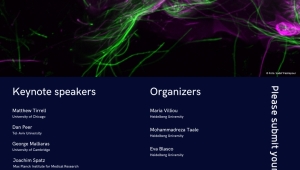
October 19th – 21st, 2022
Hybridveranstaltung
Venue: Heidelberger Akademie der Wissenschaften / online via Zoom
Organisation: Dr. Maria Viliou, Dr. Mohammadreza Taale, Jun.-Prof. Dr. Eva Blasco (Heidelberg University)
Contact: f.taheri@uni-heidelberg.de
Preliminary schedule and abstract submission: https://event.fourwaves.com/mseb1/pages
Submission period: June 1, 2022 – 00:00AM until August 1, 2022 – 23:30PM
In biomaterials research, polymer systems that can combine biomimetic capabilities with different physicochemical properties can assist in developing advanced materials and new artificial biomimetic systems (i.e. organs-on-chips, organoids, microfluidic technology, etc.). An important emerging approach in this field is "molecular engineering". By incorporating functional groups or biomolecules in complex macromolecular architectures, such as cross-linked networks, novel biomaterials can be realized. The range of possible interactions between biomolecules or cells with polymeric networks provides exciting opportunities for interdisciplinary researchers.
We aim to bring together scientists from various disciplines such as chemistry, physics, biology, material science, engineering, mathematics and medicine; we will provide a stimulating forum with prominent keynote speakers, ample opportunities for oral and poster presentations, and plenty of possibilities to interact with colleagues. Future opportunities will be discussed in the context of cutting-edge biomaterials fabrication and related disciplines, including 3D-bioprinting and biohybrid soft robotics. These topics are emerging areas in materials research and engineering which have the potential to make groundbreaking innovations that can broadly benefit society.
Objectives
1. The conference will focus on molecular systems engineering in designing biomaterials, the mechanisms of controlling cells using the mechanical properties of molecules and materials, as well as mechanical linkages of molecules to materials.
2. The conference will also cover larger-scale systems, including tissue engineering, 3D printing, and biorobotics.
3. The conference will be centered around the grand challenge of designing advanced responsive biomaterials that can physically direct cells to execute autonomous, dynamic, coordinated, and multi-scale behaviors. The conference will address this challenge by bringing together scientists from basic and applied sciences (chemistry, synthetic biology, biomedicine, materials science) and engineering to motivate new applications in biomaterials science and stimulate new collaborations to create a multidisciplinary network of researchers.
4. The conference aims to provide a stimulating forum with prominent keynote speakers, ample opportunities for oral and poster presentations, and plenty of possibilities to discuss and interact with colleagues.

